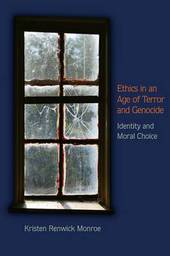
|
Ethics in an Age of Terror and Genocide: Identity and Moral Choice
Paperback / softback
Main Details
| Title |
Ethics in an Age of Terror and Genocide: Identity and Moral Choice
|
| Authors and Contributors |
By (author) Kristen Renwick Monroe
|
| Physical Properties |
| Format:Paperback / softback | | Pages:456 | | Dimensions(mm): Height 235,Width 152 |
|
| Category/Genre | The Holocaust |
|---|
| ISBN/Barcode |
9780691151434
|
| Classifications | Dewey:179.7 |
|---|
| Audience | | Tertiary Education (US: College) | | Professional & Vocational | |
|---|
| Illustrations |
3 tables.
|
|
Publishing Details |
| Publisher |
Princeton University Press
|
| Imprint |
Princeton University Press
|
| Publication Date |
13 November 2011 |
| Publication Country |
United States
|
Description
What causes genocide? Why do some stand by, doing nothing, while others risk their lives to help the persecuted? Ethics in an Age of Terror and Genocide analyzes riveting interviews with bystanders, Nazi supporters, and rescuers of Jews during the Holocaust to lay bare critical psychological forces operating during genocide. Monroe's insightful examination of these moving--and disturbing--interviews underscores the significance of identity for moral choice. Monroe finds that self-image and identity--especially the sense of self in relation to others--determine and delineate our choice options, not just morally but cognitively. She introduces the concept of moral salience to explain how we establish a critical psychological relationship with others, classifying individuals in need as "people just like us" or reducing them to strangers perceived as different, threatening, or even beyond the boundaries of our concern. Monroe explicates the psychological dehumanization that is a prerequisite for genocide and uses her knowledge of human behavior during the Holocaust to develop a broader theory of moral choice, one applicable to other forms of ethnic, religious, racial, and sectarian prejudice, aggression, and violence. Her book fills a long-standing void in ethics and suggests that identity is more fundamental than reasoning in our treatment of others.
Author Biography
Kristen Renwick Monroe is professor of political science at the University of California, Irvine. Her many books include "The Heart of Altruism" and "The Hand of Compassion" (both Princeton).
ReviewsWinner of the 2013 Giovanni Sartori Best Book Award, Qualitative Methods Section of the American Political Science Association Honorable Mention for the 2013 Robert L. Jervis and Paul Schroeder Best Book Award, International History and Politics Section of the American Political Science Association "Monroe challenges us to consider the role of identity in decision-making and to ask why some people are able to resist pressures to dehumanize others. Her work promises to help us better understand whether the roots of pro-social behavior can be expanded. Such contributions are important in any era in which terror and genocide exist."--Kristina E. Thalhammer, Perspectives on Politics "Ethics in an Age of Terror and Genocide is the culmination of Kristen Monroe's twenty years of work on altruism and moral choice. The book is magisterial in scope. Its goals are ambitious, its methods innovative, and its results provocative."--Lee Ann Fujii, Perspectives on Politics "Monroe leverages her keen insights to help us better understand human nature and then instructs us on how it is displayed in the various actions of others... Ethics in an Age of Terror and Genocide makes a scholarly contribution with a great deal of thought-provoking material that should cause readers to reflect on and better understand the forces that operate to promote good or evil in the world."--Thomas J. Williams, PsycCRITIQUES "Interesting and ambitious, this book is recommended for use in graduate courses. Some of the case studies may also be used in undergraduate teaching. It deserves wide discussion among scholars interested in ethics. At Florida State, I convene a reading group of graduate students and faculty interested in the intersections of religion, ethics, and philosophy. I plan to assign this study when we meet next fall."--John Kelsay, Holocaust and Genocide Studies
|